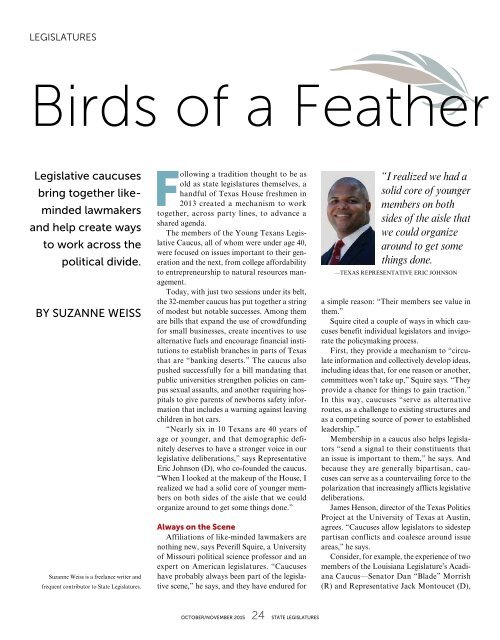Preschool Is for Real
SL_1015-
SL_1015-
You also want an ePaper? Increase the reach of your titles
YUMPU automatically turns print PDFs into web optimized ePapers that Google loves.
LEGISLATURES<br />
Birds of a Feather<br />
Legislative caucuses<br />
bring together likeminded<br />
lawmakers<br />
and help create ways<br />
to work across the<br />
political divide.<br />
BY SUZANNE WEISS<br />
Suzanne Weiss is a freelance writer and<br />
frequent contributor to State Legislatures.<br />
Following a tradition thought to be as<br />
old as state legislatures themselves, a<br />
handful of Texas House freshmen in<br />
2013 created a mechanism to work<br />
together, across party lines, to advance a<br />
shared agenda.<br />
The members of the Young Texans Legislative<br />
Caucus, all of whom were under age 40,<br />
were focused on issues important to their generation<br />
and the next, from college af<strong>for</strong>dability<br />
to entrepreneurship to natural resources management.<br />
Today, with just two sessions under its belt,<br />
the 32-member caucus has put together a string<br />
of modest but notable successes. Among them<br />
are bills that expand the use of crowdfunding<br />
<strong>for</strong> small businesses, create incentives to use<br />
alternative fuels and encourage financial institutions<br />
to establish branches in parts of Texas<br />
that are “banking deserts.” The caucus also<br />
pushed successfully <strong>for</strong> a bill mandating that<br />
public universities strengthen policies on campus<br />
sexual assaults, and another requiring hospitals<br />
to give parents of newborns safety in<strong>for</strong>mation<br />
that includes a warning against leaving<br />
children in hot cars.<br />
“Nearly six in 10 Texans are 40 years of<br />
age or younger, and that demographic definitely<br />
deserves to have a stronger voice in our<br />
legislative deliberations,” says Representative<br />
Eric Johnson (D), who co-founded the caucus.<br />
“When I looked at the makeup of the House, I<br />
realized we had a solid core of younger members<br />
on both sides of the aisle that we could<br />
organize around to get some things done.”<br />
Always on the Scene<br />
Affiliations of like-minded lawmakers are<br />
nothing new, says Peverill Squire, a University<br />
of Missouri political science professor and an<br />
expert on American legislatures. “Caucuses<br />
have probably always been part of the legislative<br />
scene,” he says, and they have endured <strong>for</strong><br />
“I realized we had a<br />
solid core of younger<br />
members on both<br />
sides of the aisle that<br />
we could organize<br />
around to get some<br />
things done.<br />
—TEXAS REPRESENTATIVE ERIC JOHNSON<br />
a simple reason: “Their members see value in<br />
them.”<br />
Squire cited a couple of ways in which caucuses<br />
benefit individual legislators and invigorate<br />
the policymaking process.<br />
First, they provide a mechanism to “circulate<br />
in<strong>for</strong>mation and collectively develop ideas,<br />
including ideas that, <strong>for</strong> one reason or another,<br />
committees won’t take up,” Squire says. “They<br />
provide a chance <strong>for</strong> things to gain traction.”<br />
In this way, caucuses “serve as alternative<br />
routes, as a challenge to existing structures and<br />
as a competing source of power to established<br />
leadership.”<br />
Membership in a caucus also helps legislators<br />
“send a signal to their constituents that<br />
an issue is important to them,” he says. And<br />
because they are generally bipartisan, caucuses<br />
can serve as a countervailing <strong>for</strong>ce to the<br />
polarization that increasingly afflicts legislative<br />
deliberations.<br />
James Henson, director of the Texas Politics<br />
Project at the University of Texas at Austin,<br />
agrees. “Caucuses allow legislators to sidestep<br />
partisan conflicts and coalesce around issue<br />
areas,” he says.<br />
Consider, <strong>for</strong> example, the experience of two<br />
members of the Louisiana Legislature’s Acadiana<br />
Caucus—Senator Dan “Blade” Morrish<br />
(R) and Representative Jack Montoucet (D),<br />
OCTOBER/NOVEMBER 2015 24 STATE LEGISLATURES


